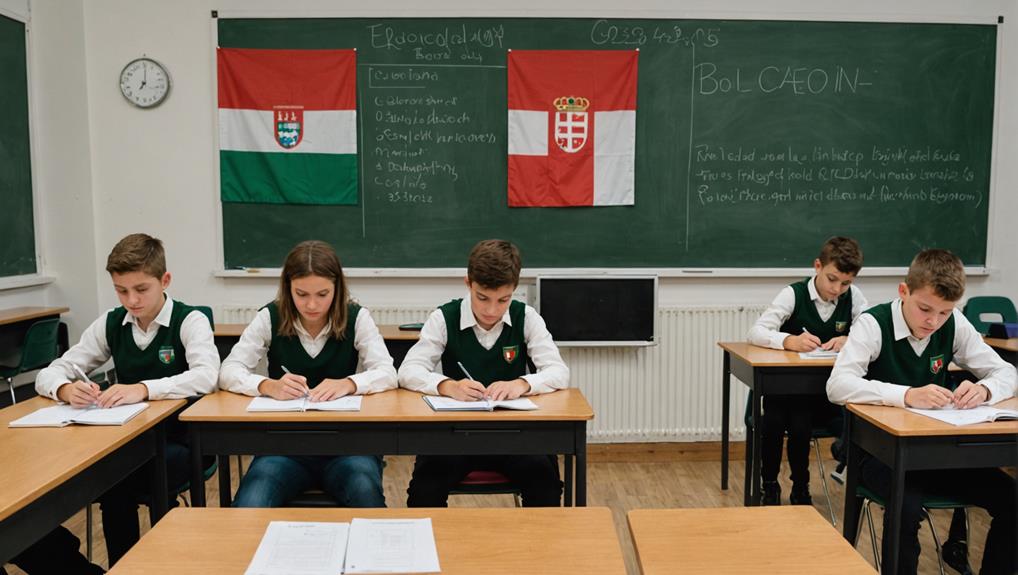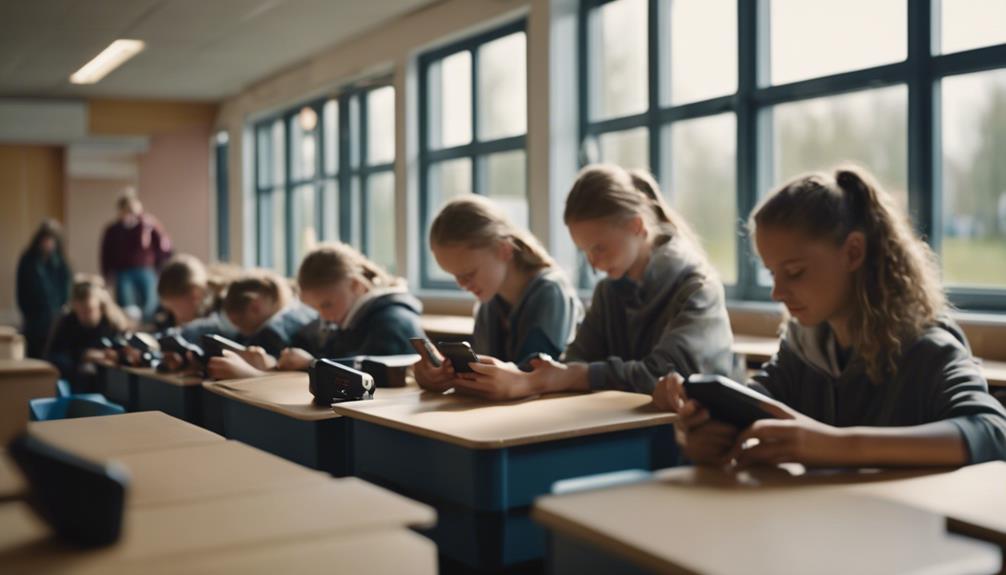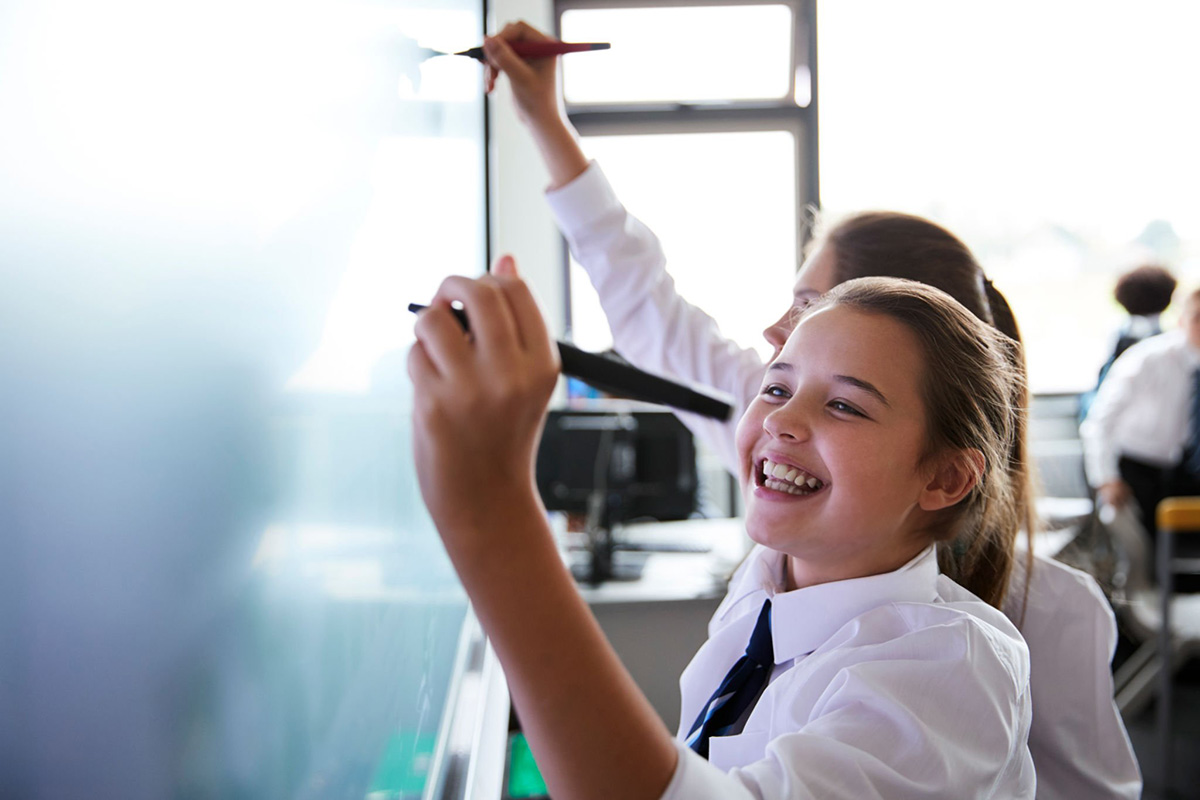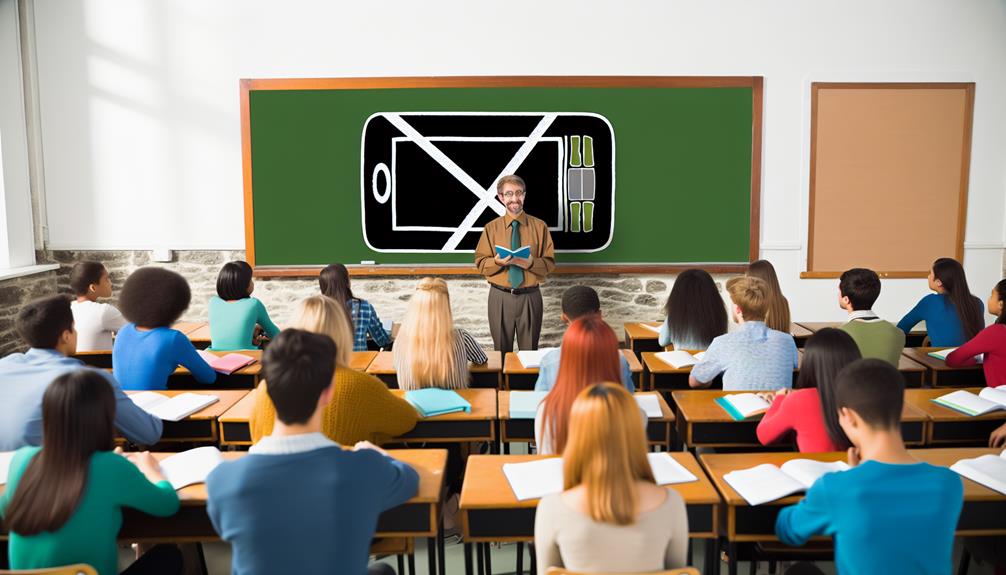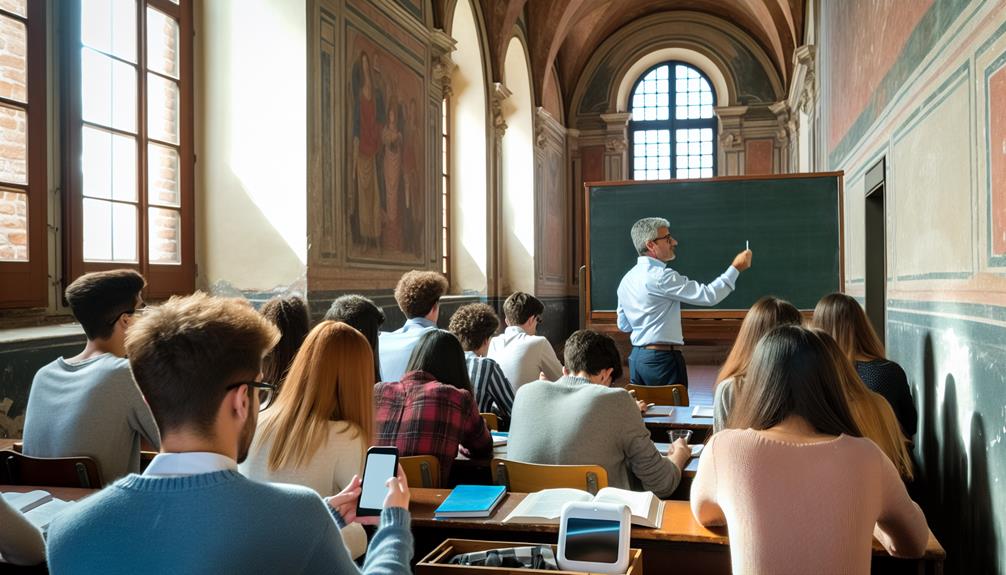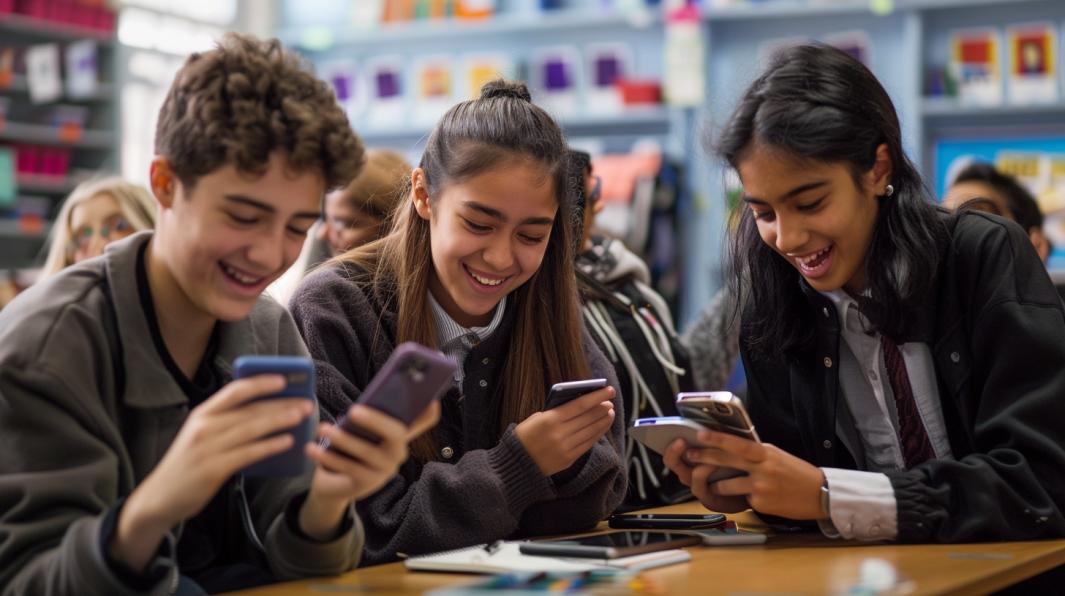The Hungarian Parliament has passed legislation restricting mobile phone usage in schools, effective September, targeting elementary through vocational high schools. This policy, supported by 85% of Hungarians, aims to reduce distractions and enhance academic performance and mental health, as indicated by expert consensus and data. It aligns with similar measures in countries like France and the UK, promoting increased student engagement and social interaction while addressing concerns about cyberbullying. While some critics suggest integrating smart devices into learning, the policy’s supporters believe the focus on reduced screen time will yield significant academic benefits. Additional insights into global practices and enforcement tools follow.
Key Takeaways
- Hungary’s Parliament voted to restrict mobile phone usage in schools, effective from September.
- The restriction applies to elementary, high, and vocational high schools.
- The policy aims to reduce distractions and enhance academic performance.
- 85% of Hungarians support the decree, with high teacher approval.
- Similar restrictions are in place in France, Netherlands, Italy, Slovakia, and the UK.
Hungary’s Law to Restrict Phone Usage in Schools
On June 10, 2024, Hungarian Parliament passed a law to restrict digital devices in schools, aiming to enhance the educational environment. The legislation, published on August 8, 2024, specifically targets the use of mobile phones, restricting their usage in Hungarian schools. The new regulations apply to elementary, high, and vocational schools, restricting the use of telecommunication devices, including smartphones and smartwatches, during school hours.
Under this legislation, students are allowed to bring mobile phones to school but must surrender their devices to teachers upon arrival. Phones will be returned only after the last lesson of the day. Teachers overwhelmingly support the regulation, believing it will foster better classroom engagement.
To address parental concerns about maintaining communication with their children, students can still contact parents before and after school. Additionally, they may use devices for educational purposes with a teacher’s permission.
This law is set to take effect on September 1, 2024, and is part of a broader initiative to tackle distractions and improve focus in classrooms. Alongside this, a list of banned items, including mobile phones and other potentially disruptive devices, will be enforced by teachers and school staff through bag inspections.
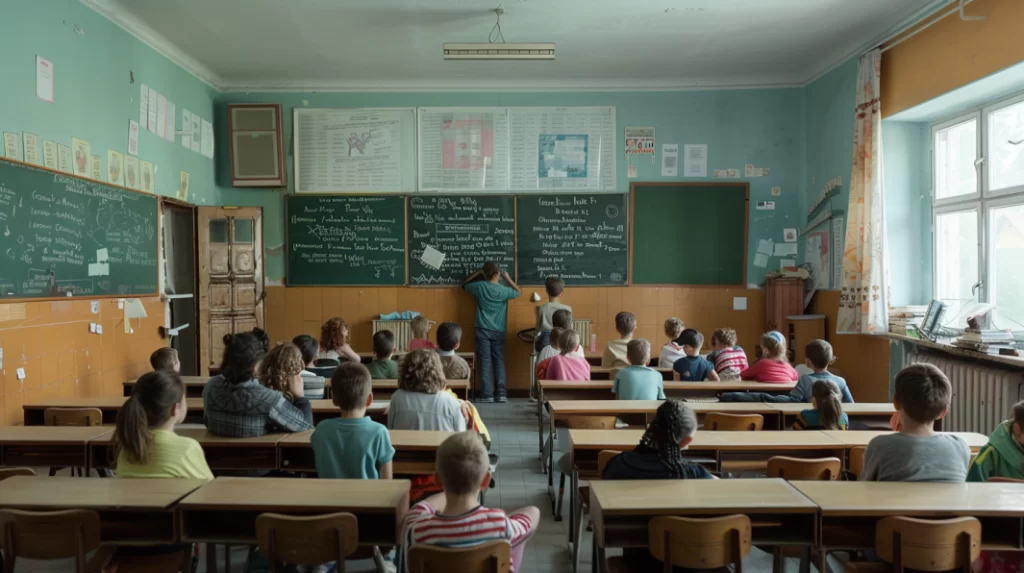
Why Restricting Phone Usage Is Necessary in Schools
Hungary’s educational landscape is witnessing a significant policy change with the restriction of mobile phone usage in schools, driven by compelling data and expert consensus. The new regulation aims to address the pervasive issue of distractions caused by mobile devices, thereby enhancing improved focus among students. Studies, including those from UNESCO, have consistently shown that excessive screen time detrimentally impacts academic performance and mental health. In Hungary, the alarming statistic that 82% of children aged 7-16 use mobile phones underscores the urgency of this policy.
Restricting phone usage facilitates better classroom management and fosters a more conducive learning environment. By minimizing distractions, students are likely to show increased student engagement and improved academic performance, evidenced by expected improvements in PISA scores. Additionally, the policy encourages social interaction and builds real human relationships, which are indispensable for holistic development.
The regulation also emphasizes the importance of achieving a technology balance, ensuring that students benefit from educational technologies without succumbing to digital dependency. Parental involvement is vital in this change, as they play a significant role in monitoring screen time outside of school.
Public Reaction to the Phone Restriction Law
The new law restricting mobile phone use in Hungarian schools has garnered significant public attention and sparked a range of reactions. A survey conducted by the Szent István Institute revealed overwhelming support for the ban, with approximately 85% of respondents approving the government’s decision. Many parents and educators view the restrictions as a necessary step to combat the distractions posed by mobile phones in the classroom.
Supporters argue that the ban will help improve students’ focus, reduce instances of cyberbullying, and enhance overall academic performance. They believe that limiting phone usage will encourage students to engage more with their peers and foster a better learning environment.
However, not all feedback has been positive. Some students express concerns about the restrictions, feeling that they limit their ability to communicate with family during the school day. Critics also question whether the law effectively addresses the deeper issues of digital addiction, suggesting that education on responsible phone use might be a more balanced approach.
Overall, the public reaction reflects a complex mix of support and apprehension, highlighting the ongoing debate about technology’s role in education. As the law is implemented, its impact on students, teachers, and the broader educational landscape will continue to unfold.
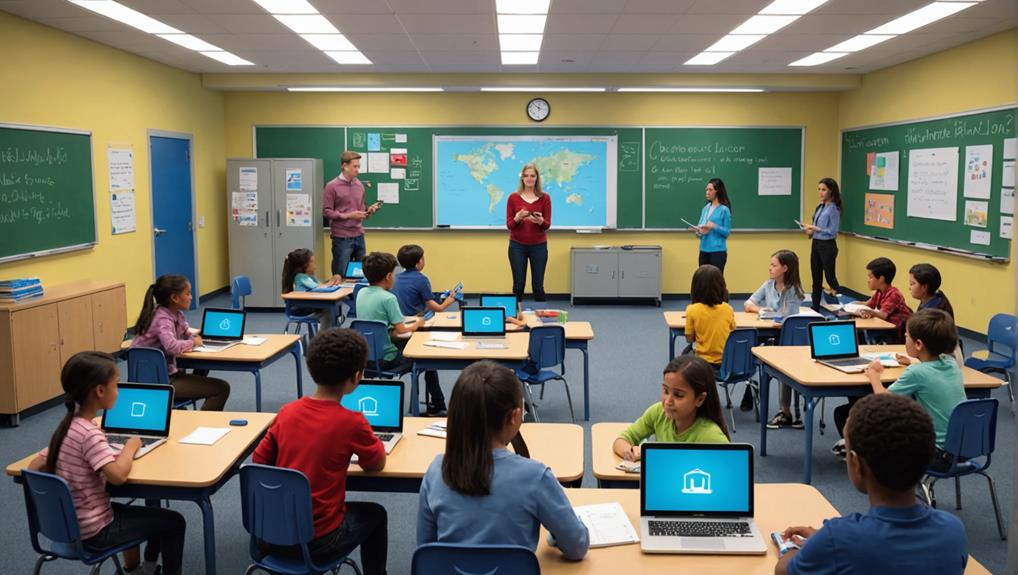
How Restricting Phone Usage Benefits Students
Restricting phone usage in schools offers significant benefits for students, primarily by enhancing focus and academic performance. Empirical evidence indicates that reduced distractions from mobile devices lead to greater student engagement in classroom activities. This heightened focus is correlated with improved academic outcomes, as students can dedicate more attention to learning tasks without the allure of digital interruptions.
Moreover, the social benefits of phone restrictions are remarkable. By promoting face-to-face interactions, schools foster a more cohesive and communicative student body. This shift away from virtual communication can strengthen interpersonal relationships and reduce incidents of cyberbullying during school hours. Consequently, these social benefits contribute to a more positive and inclusive school environment.
Psychological benefits also emerge from limiting screen time. Research suggests that excessive use of social media and digital devices is linked to various mental health concerns, including anxiety and depression. By curbing phone usage, schools can help mitigate these negative effects, thereby enhancing overall student well-being.
How Hungary’s Phone Restrictions Compare Globally
Hungary’s recent mobile phone restrictions in schools are part of a growing global trend aimed at reducing distractions and improving educational outcomes. Countries such as France, Italy, the Netherlands, and the UK have already introduced similar bans, with a focus on limiting the negative effects of phone usage on student performance and well-being. These countries report improvements in school results, reduced cyberbullying, and enhanced social interactions among students.
For instance, France implemented a nationwide mobile phone ban in primary and secondary schools in 2018, responding to concerns over phones impacting students’ attention and social skills. Italy and the Netherlands also empowered schools to restrict phone use, giving educators more control over creating focused learning environments. In Slovakia and the UK, phone bans have been credited with fostering better classroom engagement and contributing to improved academic performance.
Countries like Australia, Greece, Finland, and Sweden have taken similar steps, limiting phone use during school hours to reduce distractions and promote face-to-face communication. Despite initial concerns from parents about communication and safety, evidence from these nations shows that the benefits of the bans—improved concentration, fewer behavioral issues, and reduced dependency on social media—outweigh these concerns.
While many countries are restricting mobile phone use in schools, approaches vary—some impose outright bans, while others let schools set their own rules. Hungary’s law follows this global trend, addressing distractions and academic performance, and adds to the broader debate on balancing technology with effective learning environments.
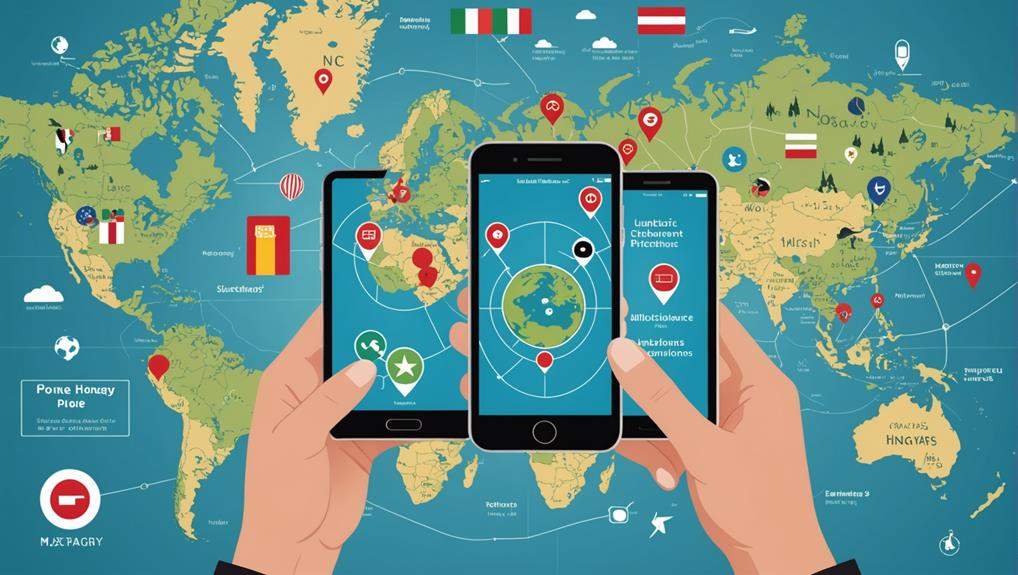
How PhoneLocker Pouch Can Help Schools Enforce Phone Restrictions
As Hungary’s new law takes effect, schools are faced with the challenge of enforcing phone restrictions in a practical and efficient way. PhoneLocker Pouch offers an innovative solution designed specifically to meet these needs, providing a secure and hassle-free method for managing mobile devices during school hours.
The PhoneLocker Pouch is a secure, tamper-proof pouch that allows students to store their phones safely throughout the school day. The pouch locks the phone inside and can only be opened with a special unlocking device at the end of the day, ensuring that students are not able to access their phones during lessons or breaks.
How it Works
The PhoneLocker pouch operates through a simple yet secure process:
Insert: Students place their phones into the designated pouch, ensuring a snug fit. This first step is vital for preventing accidental slips and ensuring phones of various sizes are securely contained.
Lock: Locking is achieved by pressing a pin into the hole, producing an audible click that confirms successful locking. This secure closure mechanism prevents unauthorized access, maintaining the integrity of the restrictions and promoting a distraction-free environment.
Access: To retrieve their phones, students place the locking mechanism near a central magnetic base. The base automatically releases the lock, providing quick and easy access. This central access system allows administrators to efficiently manage access for multiple users, enhancing security and access control within the school environment.
Key Benefits of Lockable Phone Pouch
The Key Benefits of Lockable Phone Pouch offer a compelling solution for schools aiming to enforce phone restrictions effectively. This innovative tool directly addresses pressing issues such as student productivity and classroom distractions. By keeping phones locked away, students are less tempted to check their devices, thereby maintaining focus on academic tasks and improving overall learning outcomes.
Moreover, the lockable phone pouch supports academic integrity by preventing opportunities for cheating during exams. This aligns with school policies that emphasize the importance of honest academic efforts. The pouches are equipped with special material to block phone signals, further reducing the chances of unauthorized use during school hours.
In addition to mitigating classroom distractions, the pouches also address concerns related to technology addiction. By limiting students’ access to their phones, schools can foster a healthier relationship with technology, encouraging students to engage more in face-to-face interactions and learning activities.
The design of the pouches, which fits all phone sizes, ensures practicality and ease of use. The safety flexible pin mechanism keeps students’ fingers safe, making the pouches user-friendly. Customizable with sublimation print, these pouches can also serve as branding tools for schools, reinforcing their dedication to a distraction-free learning environment.
To learn more about how PhoneLocker can transform your school’s approach to mobile phone management, get in touch with us today and ensure a distraction-free learning environment for your students.

Frequently Asked Questions
How Will the Phone Restriction Policy Be Enforced During School Trips?
Implementing phone restrictions during school events and trips will demand careful balancing between promoting classroom learning and social interactions while addressing safety concerns. Innovative solutions will guarantee educational benefits without compromising student safety.
Are There Exceptions for Students With Medical Conditions Requiring Phone Access?
Exceptions for students with medical conditions are established to prioritize student safety. Emergency protocols guarantee seamless communication, addressing concerns. Disciplinary actions are defined for misuse, balancing medical exceptions with the overall enforcement of the policy.
Will Parents Be Able to Contact Their Children During School Hours?
Addressing communication concerns, the policy will allow parents to contact their children during school hours through designated channels, ensuring parental rights and student safety. This approach aims to balance educational impact with effective policy enforcement.
How Will Schools Handle Emergencies Without Student Phones?
In the absence of student phones, schools will implement robust emergency procedures and communication protocols, addressing parental concerns and ensuring student accountability. Policy enforcement will focus on innovative solutions to maintain safety and effective communication during crises.
What Penalties Will Students Face if They Violate the Phone Restriction Policy?
Students violating the phone restriction policy may face detention consequences and parent notification. Schools will emphasize technology alternatives, peer accountability, and clear school policy communication to guarantee compliance and foster a conducive learning environment.
Conclusion
The enactment of Hungary’s law to restrict mobile phone usage in schools marks a monumental stride towards fostering an ideal educational environment. By curbing digital dependency, the legislation promises to catapult academic performance, virtually eradicate cyber-bullying, and rejuvenate real human interactions among students. As Hungary joins the vanguard of global leaders in educational reform, the anticipated outcomes underscore the transformative potential of balancing modern technological tools with essential developmental practices in academia.


